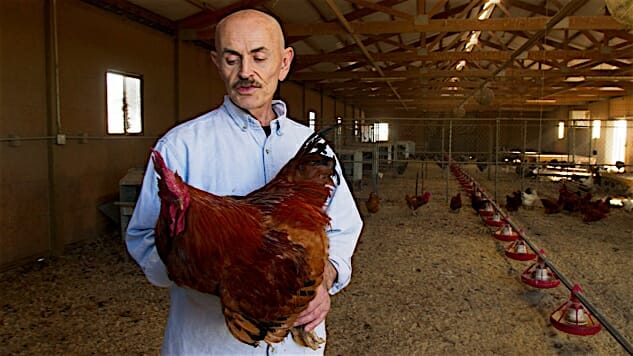Eating Animals

If you already don’t eat animals, and in particular if that’s out of an objection to the ethical and environmental impacts of factory farming, Eating Animals will basically reaffirm everything you already think and subject you to a lot of distressing images. I have a high threshold and even I had to go straight to my garden to collect eggs and pick beans to recalibrate. Everyone else: This is for you.
Documentaries tend to inhabit a spectrum that runs from “aesthete” to “infomercial” and from “Here’s what happened” to “Here’s what’s happening or going to happen, and we have a call to action for you.” Eating Animals is firmly on the latter end of that axis: While reasonably artful it is not about the art. While its production sensibility is perfectly fine, that probably isn’t what you’ll notice. Its narrative is coherent, its editing is fine, and its choices around interview subjects are wise (and include a fabulous and thoroughly classic outburst from the inimitable Dr. Temple Grandin on the subject of “ag-gag” legislation). But this film is basically 100% about message, and that message is a dire one. There are probably people who will accuse this film of propagandizing or sensationalizing or exaggerating, but from what I can tell, that’s not particularly the case. There has been too much evidence, unconnected but for the through line message that American agriculture is desperately broken, to blow off Eating Animals as the hysterical fantasy of an extremist with an agenda or fake-food-news. And if you are someone who does eat them, you should probably make sure you see what is going on to put cheap animal foods on your dinner table.
The film (inspired by, though not identical to, Jonathan Safran Foer’s book of the same name) is not a batsy treehugger paean to how lammies and ducklings are cutesypoo and we shouldn’t nom on them because they’re cute. Indeed it makes the point (as Michael Pollan did years ago in his game-changing The Omnivore’s Dilemma) that in many cases, electing to create a market for some animals is the main reason they are not extinct. (There is no such thing as a wild chicken or a wild cow; these animals only exist in husbandry situations.) Rather, the film is asking for discernment. Are you aware of what factory farming does to animals? Maybe you are and you don’t care that literally 100% of conventionally farmed turkeys are artificially inseminated because they’ve been genetically engineered to the point of being anatomically incapable of handling the reproduction thing on their own. Fine. Do you understand what factory farming does to farmers? Because if you’re okay with participating in that misery you might need a summer job working for Perdue or Tyson. Pollution and ecosystem degradation do not impress you? How about human-lethal morphogenic viruses for which we have no effective medications? How about actual nutrition? At a certain point, this film argues, your self-interest ought to kick in if nothing else grabs you by the shirt-collar. Cheap and convenient is an illusion. The costs and inconveniences are entirely real. You just might not be the one directly impacted by them.
-

-

-

-

-

-

-

-

-

-

-

-

-

-

-

-

-

-

-

-

-

-

-

-

-

-

-

-

-

-

-

-

-

-

-

-

-

-

-

-








































